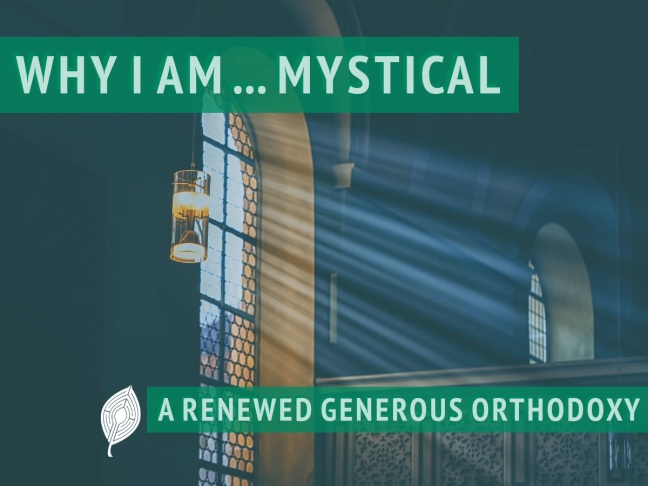In my post earlier this week talking about how and why I can identify as an evangelical, one of the themes I brought up was this tradition’s insistence on radical transformation. But as much as I loved that aspect of evangelical thought, I was ultimately frustrated in my evangelical days by the lack of transformation it actually brought. It was, as one commentator put it in the early 2000s, as though I were “thirsting for God in a land of shallow wells.” It promised water, but I was still parched. It was around this time that I became intrigued by the mystical tradition, which insists that transformation happens not in a miraculous ‘second blessing’, but as a gradual uniting of the soul with God — yes, through the power of the Holy Spirit, but pursued through practices of self-reflection, prayer and meditation. These may or may not be accompanied by manifestations such as dreams and visions, but if done right, will always create legitimate transformation of the heart and mind. Today in this series celebrating the strengths of different movements and traditions within Christianity, I’ll be looking at this ancient and mysterious approach to faith and try to answer the question: Why am I mystical?
I’ve already hinted at the first reason why I identify as mystical: In my experience, at least, it delivers on its promises. The times when I not only feel closer to God, but also see that borne out in more loving, gracious, and patient interactions in my relationships, workplace, and world around me, are the times when I am most engaged with mystical theology and practices. This tradition doesn’t over-promise — its promises are the slow transformation of the soul, like dripping water wearing away at a stone — but it delivers on it.
Related to this, the mystical tradition comes with a wide assortment of practices and disciplines. If contemporary expressions of contemplative prayer don’t work for you, maybe the Jesus Prayer or Igatius’s Gospel Contemplation will. What I like about these practices is that, more than other common practices such as ‘Bible Study’ or praying the Hours, they are oriented towards the heart more than the mind. Our culture, polarized as it is, is good at thinking and logic, and it’s good at following impulses and desires, but it’s not good at the heart. In Greek, this faculty is called the nous, and it refers to the interpretive and perceptive faculty lying in between impulse and cognition. We don’t really have a good word for this faculty in English — thankfully, Semitic languages used the word ‘heart’ as a metaphor for it, so we can use that in a pinch. But it is the whole focus of mystical practices. And it’s a needed one! When it comes to anything happening in the world, Reason might always want us to say no, and our bodily impulses and desires might always want us to say yes. But these extremes are rarely helpful. It’s the heart, the nous, that helps us to understand when to say yes and when to say no, or to what extent we should say yes.
This heart-orientation is why Christian mysticism has both championed dramatic manifestations, such as visions and dreams, and been suspicious of them. These gifts, when they are given, aren’t there as ‘rewards’ or for show; they have a purpose, which is the transformation of the heart. It’s easy to get distracted by them, or go searching after them in a consumerist way of ‘more! more! more!’ And that’s not the point at all. Julian of Norwich should be our example in all this: She had a series of visions, but rather than seeking after more, she spent the subsequent years reflecting on them and figuring out how to put them into practice. That is the heart of mysticism.
Talk about mystical practices and manifestations connects to my third reason for loving the mystical tradition: While this post is talking explicitly about Christian mysticism, mysticism itself is a broad human spiritual phenomenon. As such, engaging with it provides a helpful bridge to other religious traditions. Mysticism provides me with a solid, Christian, ground from which I can engage with Buddhism, or Sufism, or some Indigenous spiritual practices. In my own life, this kind of engagement has been very creative and productive, not in terms of appropriation or syncretism, but as a kind of mirror to help better understand and frame my experiences. (For example, I studied Eastern Christian mystical theology for my Master’s thesis. I found the language the monks used to describe their experiences a bit confused. When, later, I engaged seriously with Buddhism, that tradition’s far more robust technical language surrounding meditation helped me to better understand what those Christian monks were trying to say.) Beyond interfaith dialogue, there are also helpful connections between mysticism and psychotherapeutic modalities that take subjective experiences seriously. This is particularly true for Carl Jung’s thought, and there is a lot of interesting and helpful overlap between how he talks about the Shadow and how Christian mystics have talked about repentance for centuries. To me at least, this is compelling stuff.
So then, why am I mystical? I am mystical because this tradition offers a rich and diverse set of practices to help me in my journey of transformation into Christlikeness. And in so doing, it also provides me with helpful and beneficial bridges into broader human spiritual experience.


One thought on “Why I am … Mystical”